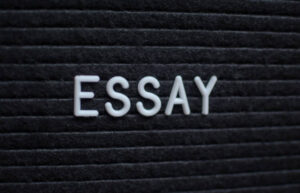How to Improve Your Academic Vocabulary
Learn how ESL students can improve academic vocabulary using practical techniques that actually work. Boost your essay writing, clarity, and grades fast.
Academic vocabulary is one of the biggest challenges for non-native English speakers.
You read an article and see words like:
-
“subsequently”
-
“nevertheless”
-
“correlation”
-
“socioeconomic”
-
“hypothesis”
And you think:
“How can I ever write like this?”
Here’s the good news:
Improving your academic vocabulary doesn’t require memorizing long lists of words.
You only need the right strategy.
This guide shows you how ESL students can improve academic vocabulary in a realistic, effective, and enjoyable way.
Why Academic Vocabulary Matters
Using the right vocabulary helps you:
✔ Sound more academic
✔ Make your arguments clearer
✔ Improve your assignment grades
✔ Communicate professionally
✔ Match university expectations
Better vocabulary = better writing.
Learn Words by Topic, Not by Random Lists
This is the #1 mistake ESL students make:
Memorizing random long-word lists like “advanced English vocabulary.”
Instead:
Learn words related to your major
Examples:
Business students:
-
revenue
-
stakeholders
-
competitive advantage
-
market segmentation
Nursing students:
-
symptoms
-
diagnosis
-
intervention
-
clinical observation
IT students:
-
algorithm
-
database
-
cybersecurity
-
encryption
Learning by topic makes the words relevant and easier to remember.
Use Academic Word Lists (AWL)
The Academic Word List contains the most common vocabulary in university writing.
Examples:
-
analyze
-
interpret
-
distribute
-
evident
-
emphasize
-
establish
-
significant
Learn 10 words per week — not 100.
Small progress = long-term mastery.
Read More Academic Texts (Just 10 Minutes a Day)
You learn academic vocabulary by seeing how it’s used.
Read:
✔ Journal articles
✔ Lecture slides
✔ High-level essays
✔ Wikipedia pages on academic topics
✔ Published reports
Focus on phrases, not only single words.
Example:
-
“compelling evidence shows…”
-
“a significant factor contributing to…”
-
“this research demonstrates that…”
These are gold for essays.
Create a Personal Vocabulary Journal
Every time you see a useful word:
-
Write it
-
Define it
-
Add an example sentence
-
Use it in your own sentence
Your journal becomes your private vocabulary toolkit.
Learn in Phrases, Not Single Words
Instead of learning:
“impact”
Learn:
“impact on”
“significant impact on”
“negative impact on”
Instead of memorizing:
“hypothesis”
Learn:
“form a hypothesis”
“test a hypothesis”
Words used together (collocations) are easier to remember.
Say the Words Out Loud
When you speak new vocabulary:
✔ Memory improves
✔ Pronunciation improves
✔ Confidence grows
Speak the words in:
-
Mirror practice
-
Voice notes
-
Study groups
Use English actively — not silently.
Write Short Paragraphs Using New Vocabulary
Every time you learn 5–10 words, write a mini paragraph using them.
Example:
“This study demonstrates a significant correlation between stress levels and academic performance. The findings emphasize the need for effective intervention strategies among international students.”
Your brain learns the words through use, not memorization.
Get Feedback From Professionals
Sometimes ESL students use vocabulary incorrectly because they don’t get corrected.
That’s where professional support helps.
How TJameStudy Improves Your Vocabulary (While Improving Your Grades)
We help ESL students by:
✔ Using academic vocabulary suitable for your level
✔ Editing your essays with stronger academic terms
✔ Teaching you how to use academic phrases correctly
✔ Fixing vocabulary misuse
✔ Providing custom word lists based on your assignments
Every assignment you receive becomes a vocabulary lesson you can learn from.
Boost your vocabulary and grades:
https://tjamestudy.com/place-order/
Better words = better writing = better results.
Quick Vocabulary Boost List (Use Immediately)
Here are 20 high-impact academic words/phrases to upgrade your writing:
-
Consequently
-
Therefore
-
Furthermore
-
Significant
-
In contrast
-
Key factor
-
This suggests
-
Plays a vital role
-
Demonstrates
-
Indicates
-
Primarily
-
Evidently
-
Notably
-
A considerable amount
-
Reflects
-
Emphasizes
-
In addition
-
However
-
It can be argued that…
-
A major implication is…
Use these in your next assignment and watch your writing elevate instantly.
Final Motivation
You don’t need perfect English.
You need effective academic English.
Every new word you learn:
-
Sharpens your thinking
-
Strengthens your writing
-
Moves you closer to top grades
-
Builds your confidence
Consistency beats perfection.
And TJameStudy is always ready to help you master academic English, one assignment at a time.









